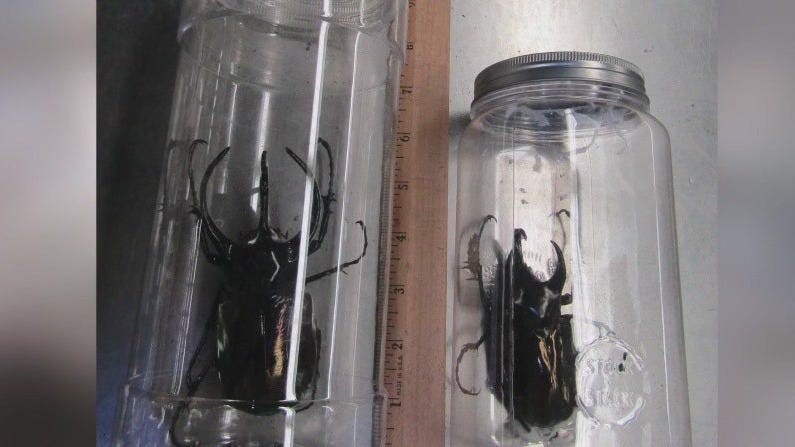37 Large Live Beetles Found Hidden In Snacks At Los Angeles Airport

More than three dozen live beetles, nearly the length of the average human hand, were discovered at a Southern California airport during a routine inspection, federal authorities announced Wednesday.
According to a release from U.S. Customs and Border Protection (CBP), agriculture specialists assigned to Los Angeles International Airport found the 37 giant beetles concealed inside of multiple packages of Japanese snacks, potato chips and chocolate.
Valued at $1,480, "the contraband" was discovered by the specialists last month during a physical examination of a shipment arriving from Japan via air cargo.
The beetles, according to the release, measured four to five inches long.
“They may look harmless but in reality, smuggled beetles pose a significant threat to our vital agriculture resources,” Los Angeles CBP Director of Field Operations Cheryl M. Davies said in the release. “Beetles can become a serious pest by eating plants, leaves, and roots and by laying eggs on tree bark which damages our forests.”
Sold online and elsewhere, the release continues, the "illegal trade of exotic insects bring hefty profits for those willing to take the risk of circumventing U.S. laws and regulations."
Importing live insects into the U.S. requires a USDA Animal and Plant Inspection Service (APHIS) Plant Protection and Quarantine (PPQ) permit, or a letter issued by PPQ Plants, Pathogens and Biocontrol unit.
“CBP agriculture specialists combine their scientific knowledge of harmful pests and plant diseases with their expertise in detecting and intercepting these threats before their enter our country,” CBP LAX Port Director Andrew H. Douglas released in a statement.The beetles were turned over to United States Department of Agriculture officials, CPB wrote in the release. The agency will determine what happens to the insects.
The beetles, the CBP reported, will likely be donated to local zoos with permits for them.
Natalie Neysa Alund is a senior reporter for USA TODAY. Reach her at nalund@usatoday.com and follow her on X @nataliealund.


